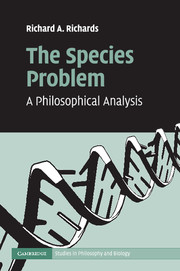Book contents
- Frontmatter
- Contents
- Acknowledgments
- 1 The species problem
- 2 The transformation of Aristotle
- 3 Linnaeus and the naturalists
- 4 Darwin and the proliferation of species concepts
- 5 The division of conceptual labor solution
- 6 Species and the metaphysics of evolution
- 7 Meaning, reference and conceptual change
- 8 Conclusion
- Bibliography
- Index
8 - Conclusion
Published online by Cambridge University Press: 04 April 2011
- Frontmatter
- Contents
- Acknowledgments
- 1 The species problem
- 2 The transformation of Aristotle
- 3 Linnaeus and the naturalists
- 4 Darwin and the proliferation of species concepts
- 5 The division of conceptual labor solution
- 6 Species and the metaphysics of evolution
- 7 Meaning, reference and conceptual change
- 8 Conclusion
- Bibliography
- Index
Summary
A RECAP
The main goal of this book is a comprehensive philosophical understanding of the species problem: the use of multiple and inconsistent species concepts that group and divide biodiversity in conflicting ways. In service of this goal, I have engaged in two projects. The first project, carried out in the first four chapters, is descriptive, and aimed at understanding the many different ways of thinking about species from Aristotle to modern biological systematics. What these chapters reveal is that, contrary to the Essentialism Story, there were many species concepts in use from Aristotle on, based on logic, theology, morphology, biological process, genealogy and more, that persisted through the Darwinian revolution to the thinking of contemporary biologists and systematists. There was no single predominant essentialist concept before Darwin, and no single predominant evolutionary concept in use after Darwin. Nonetheless, the influence of evolutionary thinking on species concepts is undeniable. Whatever else species are, evolutionary theory tells us they have beginnings, endings, cohesion, and they change over time.
The second project, carried out in chapters 5 through 7, is primarily prescriptive, aimed at understanding how we might better think about species. The main goal here is to see how our ways of thinking about species concepts can be clarified and corrected by an understanding first, of the conceptual framework in which species concepts function; second, the basic metaphysical status of species taxa; and third, the functioning of the species concepts themselves.
- Type
- Chapter
- Information
- The Species ProblemA Philosophical Analysis, pp. 205 - 220Publisher: Cambridge University PressPrint publication year: 2010

